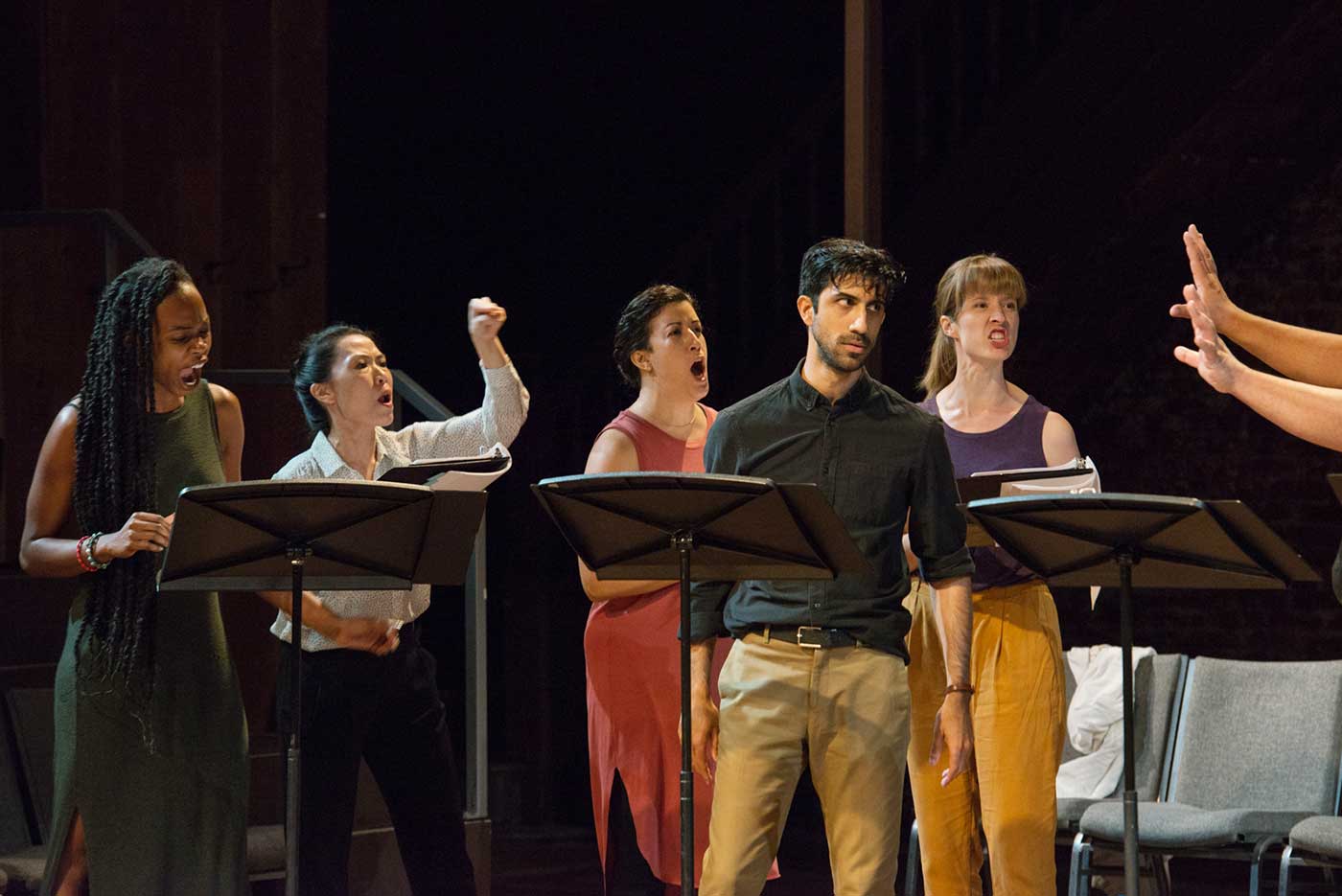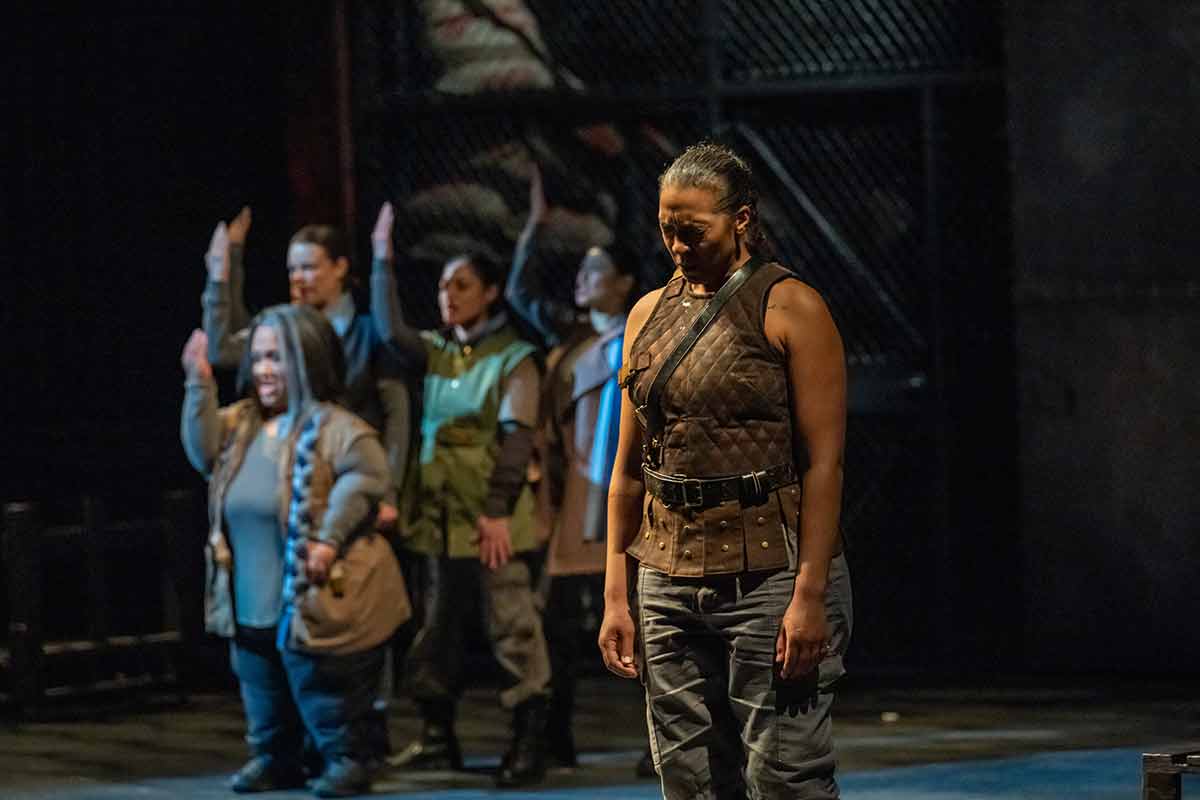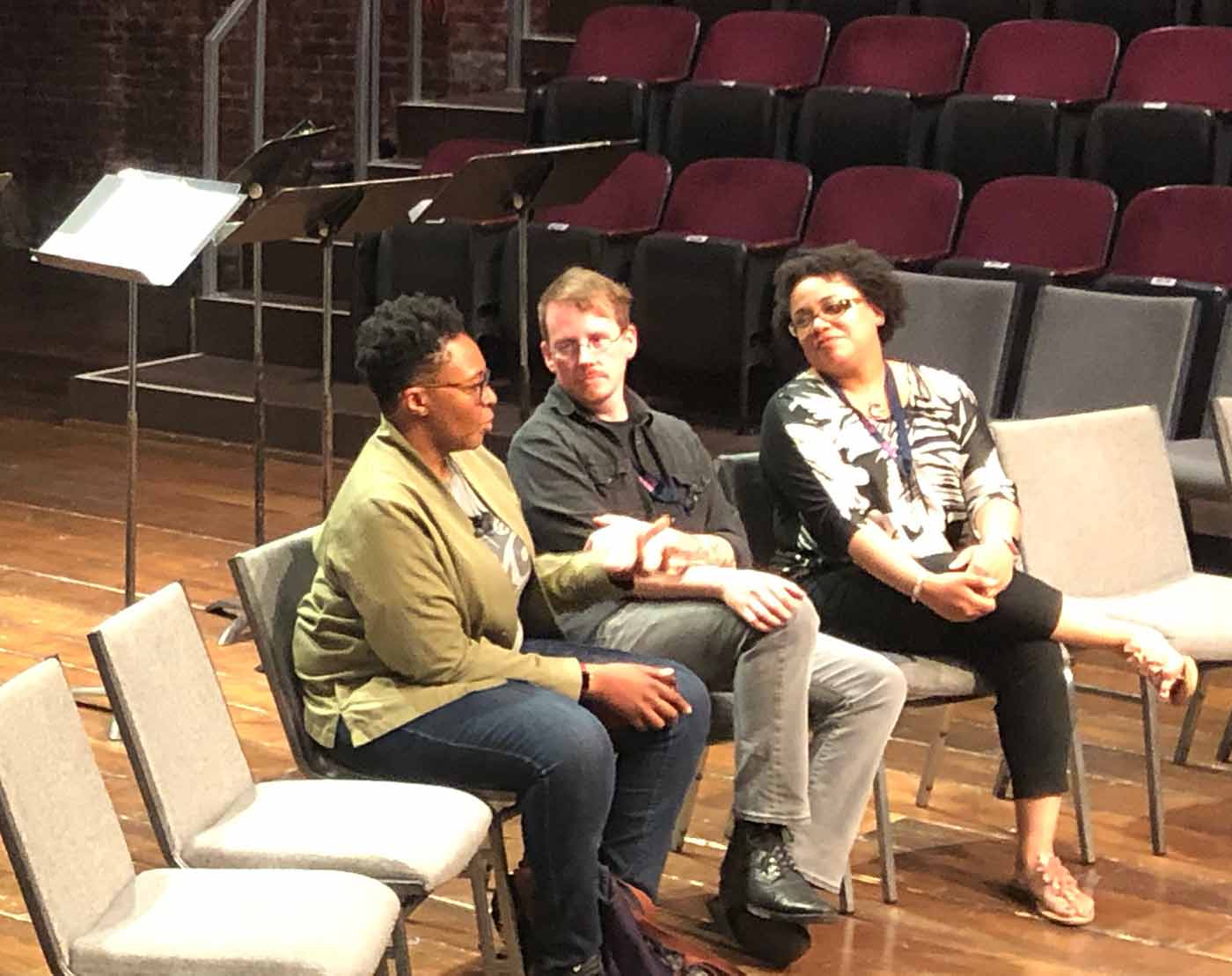Time to Read: 7 minutes
In June, the Coriolanus creative team at the Oregon Shakespeare Festival hosted a Meet and Greet, giving audiences new insights into the creation of the production. Coriolanus—a co-production by OSF and Portland Center Stage, in association with upstart crow collective and Play On Shakespeare—is a tale of civil unrest and fragile democracy.
Originally translated into modern verse by Sean San José, Coriolanus finds Rome’s famine-ravaged underclass battling the ruling elite as a war hero steps into the spotlight to serve his nation—only to turn on it and seek its overthrow. This blog shares thoughts from Coriolanus adapter and director and OSF’s Associate Artistic Director Rosa Joshi and dramaturg Kamilah Bush, who have brought Coriolanus back into the spotlight.
It’s a story about the fragility of democracy itself that asks the question: Does democracy work?
While the audience follows the troubled title character, Joshi comments on the play’s unique ability to capture an entire community: “Coriolanus is still the title character. If there’s someone whose emotional journey we follow in the play it’s him. But there’s also a story in there about a down-trodden populace manipulated by ambitious, duplicitous politicians who are in turn threatened by a revered but unpredictable war hero. It’s a story about the fragility of democracy itself that asks the question: Does democracy work? This felt like an approach that would speak more broadly to who we are in the world today. It’s an approach that also intersects with and was inspired by Sean San Jose’s modern verse translation, which for me captures the poetry of Shakespeare and also elevates the contemporary political resonances of the play in a way that makes the story feel more immediate and charged.”
What happens when self-interest, self-preservation, and extreme allegiance to integrity of self come into clash with the needs of a just and fair society? That, to me, is a modern problem. That’s a question I ask myself today all the time.
Joshi states that her way into Coriolanus was the idea of political manipulation, which permeates the play. She argues, “The people have a legitimate grievance at the start of the play—they are famished. This makes them vulnerable to manipulation by duplicitous, power-hungry politicians who are able to rouse the people up into a mob and manipulate them to their own ends. The politicians also try to manipulate Coriolanus: A man who’s been bred by his mother and the state into a fearsome warrior, a war machine, who’s revered for his victorious record and for the wounds he’s suffered in battle. The politicians want to mold Coriolanus into a politician they can control. But, of course, they can’t control him. He’s not a politician—he’s a warrior who has a sense of honor that is absolute, who refuses to compromise who he is, and who cannot disguise his hatred for the common people. Coriolanus is acting with uncompromising integrity of self. What happens when self-interest, self-preservation, and extreme allegiance to integrity of self come into clash with the needs of a just and fair society? That, to me, is a modern problem. That’s a question I ask myself today all the time. There’s a scene in the play where senators are telling the common people that they need to storm the Capitol, say the votes were not properly cast, and overturn the election. I’m not making that up—that’s in the play.”
Coriolanus is one of Shakespeare’s least-produced plays, but its political resonances are unsettlingly similar to today’s political atmosphere. The old adage is that history is cyclical and repeats itself—today’s news will one day become history, which then becomes myth, and vice versa. Dramaturg Kamilah Bush says, “So much of what we know about Roman history has been filtered through myth, so much [so] that myth and history have in some ways become one and the same. We know how much of our own history and lived experiences are mixed in with myth these days. How much of what we know has been invented? In Coriolanus, we see what we know to be true—that you can make celebrities out of politicians and politicians out of celebrities. This is the same in history-making and myth-making. When I do research, I constantly ask myself, ‘Who wrote this down and why?’ When we use the dramaturgy I’ve found, we then must eat the meat and spit out the bones. And only keep what is useful to tell the story we’re meaning to tell.”
In Coriolanus, we see what we know to be true—that you can make celebrities out of politicians and politicians out of celebrities. This is the same in history-making and myth-making. When I do research, I constantly ask myself, ‘Who wrote this down and why?’ When we use the dramaturgy I’ve found, we then must eat the meat and spit out the bones.
One unique aspect to this production is the gratifying signature touch of upstart crow collective, which casts its productions with all female and non-binary performers. “Coriolanus is a very male play,” says Joshi. “One thing we explored while workshopping was masculinity and the warrior ideal. Coriolanus is steeped in a culture of mythologizing the warrior and what it is to be a man and fight for your country. When you take on this play with a cast of eight women and non-binary people, you look at male behavior differently—you take it less for granted.”
The visual world—designed by Sarah Ryung Clement (Scenic) and Sarah K. Hughey (Lighting & Costumes)—of the production will bridge history with the contemporary, allowing audiences to see themselves in the story. Audiences will see the inspiration of Roman history and political structure, as well as modern protests, riots, and senate brawls, through an abstracted and stylized design. Costumes, for instance, will have a nod to the toga and the political suit. And since a cast of eight performers needs to be able to transform into different characters on a dime, Clement has created ingenious stage magic that can even transform armor into corsets. Movement and stage combat, choreographed by Alice Gosti, will have the signature styling of upstart crow and audiences will hear music and sound inspired by modern protests, designed by Caroline Eng. “The social political world of the play will be of Ancient Rome—early Republic,” says Joshi. “But we’ll always be thinking about how that world is connected to our own contemporary lives.”
Coriolanus is a messy play with complicated characters, disheveled politics, and no clear answer on who to root for. But Joshi loves messy plays. She says,
The complication is the point of the play—the mess is left for us to sort out and for us to deal with. It’s up to us to grapple with and figure out what to do with our own flawed and fragile democracy. So welcome the mess.
See the Production

Coriolanus will run from July 23 through October 13, 2024 at the Oregon Shakespeare Festival. Get your tickets below or read more about the first iteration of this production, which was produced at Portland Center Stage.
Header and Thumbnail image:
Cast of CORIOLANUS produced at Portland Center Stage in partnership with the Oregon Shakespeare Festival and in association with upstart crow collective and Play On Shakespeare. Spring 2024. Courtesy Portland Center Stage.
Want to learn more about this translation?
Read about the origins of Sean San José’s translation of Coriolanus, review press articles, find publications and podcasts, and learn more about the artists involved, all in one place!

-

Level Up Your Reading List
This fall, Play On Shakespeare has the perfect reading list for you, with books written by some of our partner artists! -

Playwriting at Play On Shakespeare
Our playwrights took on the challenge of translating Shakespeare’s works into modern verse. Here’s what they have to say. -

CORIOLANUS Brings Democracy Into Question
CORIOLANUS is about to hit the Oregon Shakespeare Festival stage! Read on to glean exclusive insights by director Rosa Joshi and dramaturg Kamilah Bush on the creation of CORIOLANUS. -

What is a Dramaturg?
Read on to learn about dramaturgy, it’s many definitions, and the Literary Managers & Dramaturgs of the Americas!
